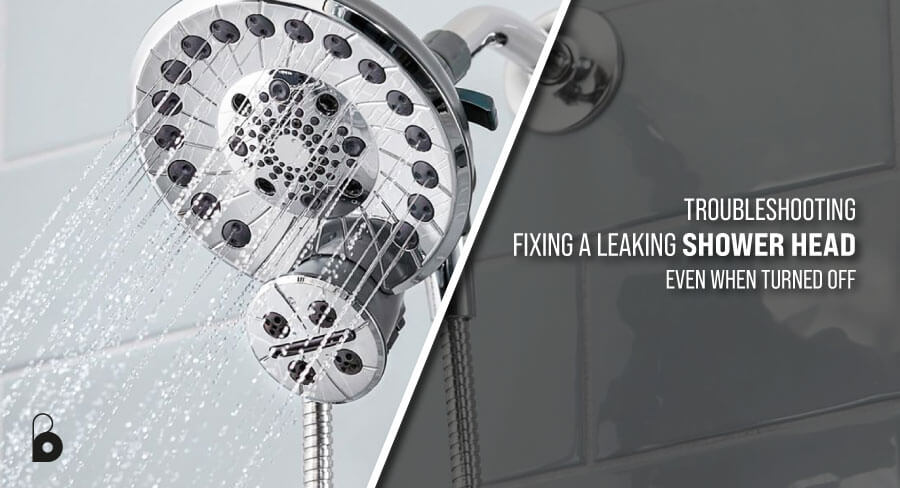Troubleshooting A Shower Head Leaking when off: The Best Solution
When you step out of the shower, the last thing you want is a persistent issue—your shower head leaking water even when it’s turned off. This predicament not only leads to wastage of water but can also cause potential damage to your bathroom and hike up your utility bills.
Addressing a leaking showerhead promptly is vital for various reasons. First and foremost, it conserves water, contributing to a sustainable environment. Additionally, prompt repairs save you money on water bills and prevent any potential water damage to your bathroom fixtures and structures.
The primary purpose of this article is to equip you with the knowledge and solutions needed to tackle a leaking shower head that persists even when the water is turned off. We’ll explore the common causes of this issue and provide you with practical tips and DIY fixes to address and resolve the problem effectively. By the end, you’ll have a clear understanding of how to manage a leaking showerhead and prevent it from happening again.
Table of Contents
Understanding the Shower Head Leaking when Off
To fix a persistently leaking shower head when turned off, it’s crucial to know what causes this problem. We’ll explore common issues such as water pressure fluctuations, component wear, mineral buildup, and faulty diverter valves. Understanding these causes will guide effective solutions.
- Potential Reasons for a Shower Head Leaking When Off: There are several potential reasons behind a shower head leaking even when turned off, ranging from water pressure problems to faulty components.
- Water Pressure Issues: Inadequate or fluctuating water pressure can lead to a leaky shower head when the water is meant to be off. Understanding and managing water pressure is crucial in resolving this issue.
- Damaged or Worn-out Components: Over time, shower head components like washers, O-rings, or seals can wear out or become damaged, resulting in leaks even when the shower is turned off.
- Corrosion and Mineral Deposits: Accumulated corrosion or mineral deposits within the shower head can interfere with its functionality and cause persistent leaks.
- Faulty Diverter Valve: A malfunctioning diverter valve, responsible for directing water flow in showers, can be a prime culprit behind a leaking shower head even when not in use. Understanding this valve’s role is essential in troubleshooting the issue effectively.
To fix a persistently leaking shower head when turned off, it’s crucial to know what causes this problem. We’ll explore common issues such as water pressure fluctuations, component wear, mineral buildup, and faulty diverter valves. Understanding these causes will guide effective solutions.
| Potential Reasons for a Shower Head Leaking When Off | There are several potential reasons behind a shower head leaking even when turned off, ranging from water pressure problems to faulty components. |
|---|---|
| Water Pressure Issues | Inadequate or fluctuating water pressure can lead to a leaky shower head when the water is meant to be off. Understanding and managing water pressure is crucial in resolving this issue. |
| Damaged or Worn-out Components | Over time, shower head components like washers, O-rings, or seals can wear out or become damaged, resulting in leaks even when the shower is turned off. |
| Corrosion and Mineral Deposits | Accumulated corrosion or mineral deposits within the shower head can interfere with its functionality and cause persistent leaks. |
| Faulty Diverter Valve | A malfunctioning diverter valve, responsible for directing water flow in showers, can be a prime culprit behind a leaking shower head even when not in use. Understanding this valve’s role is essential in troubleshooting the issue effectively. |
Inspection and Diagnosis
This section will analyze the shower head leaking when off from the inspection and diagnosis perspective. Such as-
Step-by-Step Shower Head Check
Start by examining the shower head for visible issues like cracks, loose connections, or mineral buildup. This step-by-step inspection helps identify any problems that could be causing the persistent leakage, even when the shower is turned off.
Diverter Valve and Components Examination
Inspect the diverter valve and associated components such as washers and O-rings. These parts are critical in regulating water flow. A thorough examination will reveal if any of these components are damaged, contributing to the continuous leakage.
Assessing Water Pressure Impact
Evaluate the water pressure in your plumbing system. Fluctuating or inadequate water pressure can put additional stress on the shower head, leading to leaks. Understanding how water pressure influences the shower head’s performance is key to diagnosing and resolving the leakage issue.
Read More: Stained Glass Bathtubs: Amazing Artistic Fusion for Elegant Baths

DIY Fixes and Solutions
Discover simple and effective DIY fixes to address a persistently leaking shower head:
- Adjusting Water Pressure: Learn how to adjust the water pressure in your shower to optimal levels, preventing excessive stress on the shower head and potential leaks.
- Cleaning and Maintenance: Explore the steps for regular cleaning and maintenance of your shower head to remove mineral deposits and ensure smooth water flow, reducing the likelihood of leaks.
- Replacing Worn-out Washers or O-rings: Understand the importance of washers and O-rings in preventing leaks, and learn how to replace them when worn-out, restoring the shower head’s efficiency.
- Fixing a Faulty Diverter Valve: Discover how to fix or replace a malfunctioning diverter valve, a crucial component that directs water flow and prevents unnecessary leaks.
- Applying Plumber’s Tape or Sealant: Learn how to apply plumber’s tape or sealant correctly to seal any gaps or joints, effectively stopping leaks and ensuring a leak-free shower experience.
Seeking Professional Help
If DIY solutions aren’t resolving the issue, it may be time to seek assistance from a professional plumber. Here’s a broader look at when and how to involve a professional:
- Indications That It’s Time to Call a Plumber: Explore the signs that suggest you should reach out to a plumber, such as persistent leaks despite DIY efforts, low water pressure, or unusual sounds within your plumbing system.
- How a Professional Plumber Can Diagnose and Fix the Issue: Understand the expertise a professional plumber brings to accurately diagnose the problem through advanced tools and experience. They can provide efficient solutions, whether it’s repairing damaged components or suggesting necessary replacements.
- Tips for Choosing a Reputable Plumber for the Job: Gain insights into selecting a reliable and trustworthy plumber, including factors like experience, certifications, customer reviews, and getting multiple quotes. Making an informed choice ensures a successful resolution of your shower head leakage problem.
Preventing Future Leaks
Preventing future leaks from your shower head involves adopting proactive measures and maintaining a diligent upkeep routine. Here’s a more comprehensive look at how to ensure a leak-free showering experience:
Regular Maintenance Tips
Regular maintenance is key to a well-functioning shower head and a leak-free bathroom. Consider the following tips to maintain your shower head in optimal condition:
- Frequent Cleaning: Regularly clean your shower head to remove mineral deposits, grime, and other debris that can clog the openings and disrupt water flow.
- Inspect for Wear and Tear: Periodically check for any signs of wear, cracks, or rust on the shower head. Replace worn-out washers, O-rings, or damaged components promptly.
- Seal Leaks Promptly: If you notice any signs of leakage, address them immediately. Applying a plumber’s tape or sealant to the affected areas can prevent minor leaks from escalating.
- Proper Installation: Ensure your shower head is installed correctly to prevent any unnecessary stress on the components, which can lead to leaks.
Suggested Practices for Maintaining Optimal Water Pressure
Maintaining optimal water pressure not only ensures a satisfying shower but also contributes to a leak-free system. Here are some practices to maintain appropriate water pressure:
- Regular Pressure Checks: Periodically check the water pressure in your plumbing system. An ideal pressure range ensures that your shower head functions optimally without leaks.
- Address Pressure Issues: If you notice inconsistent or excessively high water pressure, consult a plumber to install a pressure regulator or address any underlying problems.
- Avoid Sudden Pressure Changes: Be cautious of sudden pressure spikes, which can stress the plumbing system. Gradual adjustments to water pressure are recommended.
Using Water-Softening Systems
Mineral buildup due to hard water can lead to clogs and affect your shower head’s efficiency. Utilizing water-softening systems can prevent mineral accumulation and ensure a smooth water flow:
- Install a Water Softener: Consider installing a water softener in your home’s plumbing system to reduce the mineral content in the water. This helps prevent scale buildup in your shower head.
- Regular Maintenance of Water Softener: Follow the manufacturer’s guidelines for maintaining and servicing your water softening system to ensure it functions effectively in preventing mineral deposits.
By following these maintenance tips, adopting good practices for water pressure management, and considering water-softening systems, you can significantly reduce the risk of future leaks and extend the life of your shower head.
Preventing Future Leaks
Quick tips to prevent leaks and maintain a durable shower head:
| Section | Tips and Practices |
|---|---|
| Regular Maintenance |
|
| Optimal Water Pressure |
|
| Water-Softening Systems |
|
Conclusion
In conclusion, we’ve identified the key causes of a persistently leaking shower head: water pressure issues, worn-out components, corrosion, mineral deposits, and faulty diverter valves. Swift action is vital in addressing this problem to avoid water wastage and potential damage. Regular maintenance, encompassing cleaning and timely repairs, plays a crucial role in preventing future leaks. Let’s act promptly and prioritize maintenance to enjoy a hassle-free and eco-conscious showering experience.
Frequently Asked Questions
Why is my shower head leaking when off?
If your shower head is leaking even when turned off, it could be due to several reasons such as a faulty diverter, worn-out seals, or a loose connection. Proper diagnosis and repair are essential to stop the leakage.
How can I stop my shower head from leaking when the water is off?
To stop a shower head from leaking when the water is off, you may need to check and tighten connections, replace worn-out seals, or repair the diverter. Consulting a plumber for a thorough assessment and appropriate fixes is advisable.
What are the reasons for my shower head leaking when the water is off?
Shower head leakage when the water is off may result from a worn-out diverter, damaged seals, loose connections, or internal pipe issues. Identifying the root cause is crucial to effectively address the leakage.
How do I prevent water from leaking through the shower head when it’s off?
To prevent water from leaking through the shower head when it’s off, inspect and maintain the diverter, replace damaged components, and ensure all connections are secure. Regular maintenance and prompt repairs can help maintain a leak-free shower head.
Why does water leak through my shower head even when it’s turned off?
Water leakage through the shower head when it’s turned off can occur due to diverter issues, deteriorated seals, or a malfunctioning valve. Professional evaluation and repairs are necessary to resolve this issue effectively.
How do I fix an Oxygenics shower head that leaks when off?
If your Oxygenics shower head is leaking when off, start by checking for loose connections and worn-out seals. If the issue persists, contacting Oxygenics customer support or a professional plumber for guidance and repairs is recommended.
What should I do if water is leaking from the shower head when the water is off?
If water is leaking from the shower head even when the water is off, it’s crucial to inspect the diverter, seals, and connections. Repairing or replacing faulty components will help resolve the leakage and ensure proper functioning.
Why is my shower head loose and leaking when off?
A loose shower head can cause leakage even when the water is off. Tighten the shower head securely and inspect for any damaged or worn-out parts. If the problem persists, seek professional assistance to address the issue effectively.

